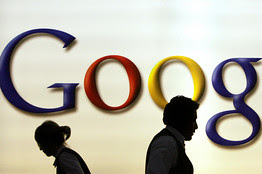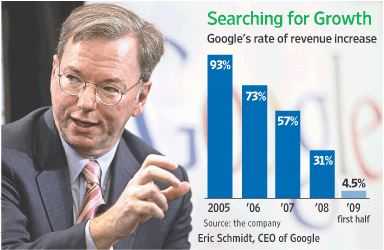By The Wall Street Journal
Is Google the next eBay?
Maybe. There are some worrisome parallels between Google today and eBay in 2005-06, as the online-auction company's growth was faltering.
Consider this history: In August 2004, then-Chief Executive Meg Whitman said she didn't believe eBay was approaching anything like saturation. Just six months later the company issued a weaker-than-expected forecast that in hindsight was the end of its red-hot growth phase. EBay's stock is now trading at less than half its December 2004 level.
 Through 2005-06 some hoped that eBay's PayPal unit, acquired in 2002, and Skype, in 2005, would prove to be new growth engines, along with international markets. As it turned out, of course, after writing off much of the Skype purchase price, eBay now is looking to jettison it. And growth at PayPal and internationally hasn't been enough to stop eBay's top-line growth rate from decelerating.
Through 2005-06 some hoped that eBay's PayPal unit, acquired in 2002, and Skype, in 2005, would prove to be new growth engines, along with international markets. As it turned out, of course, after writing off much of the Skype purchase price, eBay now is looking to jettison it. And growth at PayPal and internationally hasn't been enough to stop eBay's top-line growth rate from decelerating.When it comes to Google, there also are hopes for international growth. YouTube has some similarities with Skype, high user traffic but relatively low revenue. Whether YouTube can live up to its promise as a big ad platform is uncertain.
Another of Google's potential growth engines is Android. But its ability to help Google expand in the mobile-ad market remains unproved.
Certainly, Google can claim lots of phones soon may be using the Android operating system. Unfortunately, they don't include the two phone brands that account for much of the growth in the smart-phone market, Apple and Research In Motion's BlackBerry. Google also is banking on expanding into display advertising.
While investors wait for these new initiatives to prove themselves, growth is slowing in the core paid-search ad business. Google's revenue growth rate has fallen from 93% in 2005 to 31% in 2008.
The recession has demonstrated the Internet company isn't immune from pressures other ad-dependent businesses face. Revenue growth dropped to 3% year on year in the second quarter.
Moreover, as U.S. revenue growth was only 1.6%, it is possible that Google's core search business actually shrank in the U.S. when contributions from newer businesses like mobile advertising are excluded.
Google's revenue growth will certainly accelerate coming out of the recession. The issue is by how much and for how long.
In the short term, growth will be sparked by "price reinflation of key words," said Majestic Research Managing Director John Aiken. Prices fell during the worst of the slump. Assuming demand returns, price per clicks should rise again.
 But that won't sustain growth long term. That rests on several other variables, including where consumers go to search the Internet and how many searches they do.
But that won't sustain growth long term. That rests on several other variables, including where consumers go to search the Internet and how many searches they do.Competition from Microsoft's revamped search engine, Bing, is showing signs of life. Search marketing reported this month that Bing had lifted its paid-click market share 44% since the beginning of June. It still is only 4.9%, but Microsoft's share will rise assuming the deal with Yahoo is completed.
It would be foolish to predict that Google won't have another business success, of course. Microsoft managed to leverage its strength in PC operating systems into a stranglehold over the word-processing and spreadsheet applications.
But investors should be careful buying on such hopes. With Google's medium-term revenue growth likely to fall toward 10%, it is hard to justify paying 25 times 2009 consensus earnings, including the cost of employee stock options. Google may itself discover the next Google-like business.
But until it proves that case, investors may want to wait for the stock to retreat.
